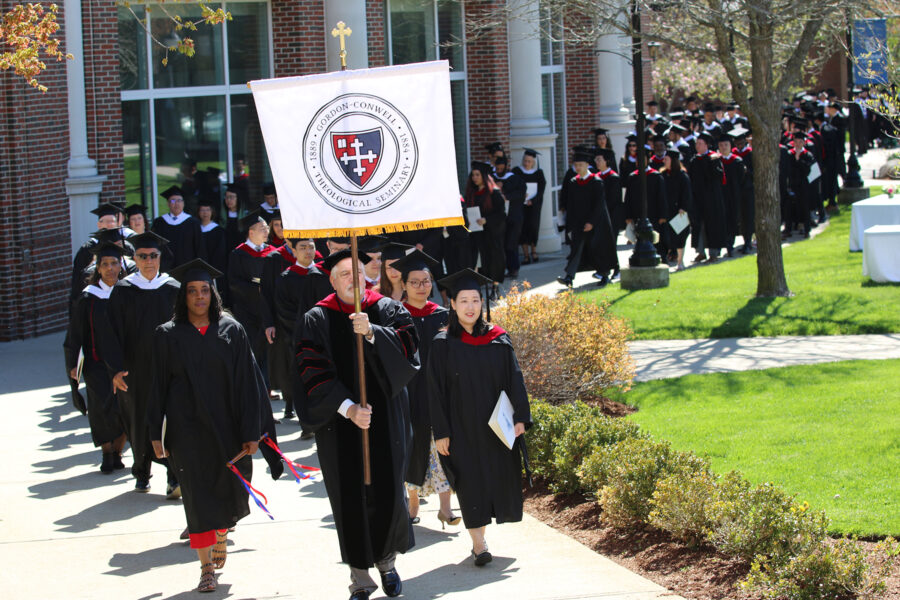Attentiveness: Commencement
Life is often confusing, difficult, and seemingly meaningless. But every once in a while, we are forced to pause and lift our heads above the fray. As if invited to see with the Father’s eyes, it then becomes clear that life is actually meaningful, beautiful, and joyful.
Many of us had such an experience last weekend. Two ceremonies that are precious, even as part of our spiritual formation, gave us these “eyes” to see: baccalaureate on Friday and commencement on Saturday.
The people at the seminary have been working very, very hard to keep the Gordon-Conwell caravan moving smoothly through the desert of disruptions and difficulties. After much behind-the-scenes work (as if washing students’ feet) the ceremonies took place and students were honored to begin (to commence) their service to the Kingdom. Prayers, testimonies, Scripture, and singing reminded us of our purpose and goal in what we do.
Relatives from around the world and around the block came dressed up as a way of showing respect for what was to happen. And what happened was worthy of formal attire. One person remarked, “I wear a tie one day a year: when I work behind the scenes for commencement and then attend the celebration.”
We heard five students share and one read Scripture during those two worship services. The student talks, though brief, were windows into the seminary, and even the Christian life of the mind. Students from very diverse backgrounds expressed common values in the need to think well about theological topics, but also the need to live into the theology we espouse. Articulate, thoughtful, humble, and thankful; well, I verged on the precipice of pride listening to them.
So, in the midst of all the deadlines, and long nights, and many responsibilities, clarity came to me and to many of us who were celebrating hard work completed. But do the fanfare, the academic robes, and the formality add anything to what we are doing?
Before I answer that question, let me self-disclose that I am not a big fan of extravagance in life. I dress simply, we only have one car, and I usually preach without a clerical robe. However, as with the ceremonies in the Old Testament, the idea of marking time and remembering God’s grace and favor do involve sacred signs, symbols, and dress—a type of formality and “sacredness” when we understand the word as “set apart.”
We set apart a time and place. And in this past weekend our ceremonies did reveal a sacredness or a sense of the holy.
What prompted my message at commencement was the image from Exodus 28:36 of Aaron and the priests wearing a turban with a gold plate on which the words “Holy to the Lord” were etched. There is a sacredness, a holiness, that we pray for as we send out students who have been in our care for up to five, six, or even eight years. Sacred moments invite a certain memorable formality. Memorable formality is not required, but it does emphasize for all of us the importance of what has taken place.
Stop. Remember. Reflect. Then reflect again.
So, as I look back at the pictures and remember the comments from graduates, spouses, parents, and even children (!), I am thankful. I am thankful that we take the time to honor hard work, and that we do so in the form of formal (set apart) worship and praise. These ceremonies also mark a transition.
I was reminded this weekend of an important transition celebrated in my own life thirty-six years ago: my ordination. The ceremony for me marked my time before being “set apart” for ministry in the church to new responsibilities, even a new identity.
Preaching at my ordination was my PhD advisor, Dr. Samuel H. Moffett. I remember so clearly how he talked about putting on the mantle, symbolized in putting on my clerical robe. He then grabbed my new clerical robe and put it on me. This symbolized a new identity that I would have as long as I am ordained, and which I still feel today. That hot day in July thirty-six years ago marked a before and after. It still guides my decisions and sense of identity today, whether I wear the robe or not.
So, I think in an age of confusion, antagonisms, informality, and the many demands of technology (“Click on me!”) it is healthy to stop and rise above the noise and many voices as if to say, “Praise the Lord! Look at what God has done in preparing leaders for the Church!”
Remember, celebrate, and live into a new identity for the Kingdom. Give thanks!
We did, and it was awe-inspiring. And we will do so again on Saturday with our Charlotte, Jacksonville, and Networked Education students.
 Dr. Scott W. Sunquist, President of Gordon-Conwell Theological Seminary, is author of the “Attentiveness” blog. He welcomes comments, responses, and good ideas.
Dr. Scott W. Sunquist, President of Gordon-Conwell Theological Seminary, is author of the “Attentiveness” blog. He welcomes comments, responses, and good ideas.
